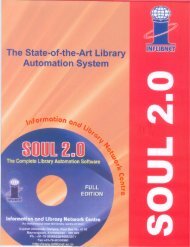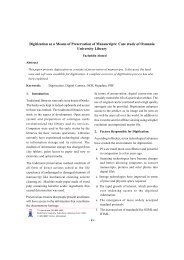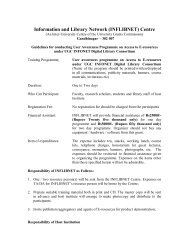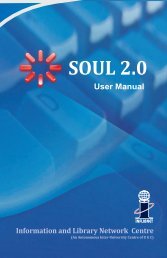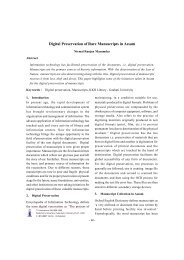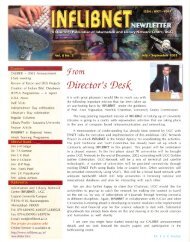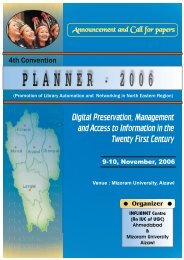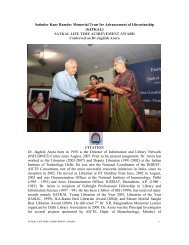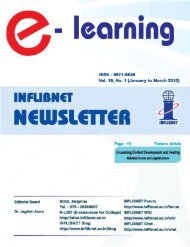Panjab University - INFLIBNET Centre
Panjab University - INFLIBNET Centre
Panjab University - INFLIBNET Centre
Create successful ePaper yourself
Turn your PDF publications into a flip-book with our unique Google optimized e-Paper software.
46 M.A. POLITICAL SCIENCE (SEMESTER SYSTEM) SYLLABUS16. Kumkum Sangari, 1995, “Politics of Diversity, Religious Communities and Multiple Patriarchies”,Economic and Political Weekly, 23 December, 1995.17. Susie Tharu, “Towards a Historiography of Women in People’s Struggles” in A. Suryakumari (ed.),Women’s Studies : An Emerging Discipline, Gyan Publishing House, New Delhi, 2004.18. Archna Parasher, Women and Family Reform Law in India, Sage, New Delhi, 1992.19. Ritu Dewan, “Gender in Neo-Classical Economics”, Economic and Political Weekly, 29 April, 1995.20. Bharati Ray, ed., Women of India : Colonial and Post-Colonial Periods, Sage, Delhi, 2005.21. Sadhna Arya, Anupama Roy ed., Poverty, Gender and Migration, Delhi, Sage, 2006.Option (d) : RIGHTS : IDEAS AND MOVEMENTSINSTRUCTIONS FOR THE PAPER-SETTERS AND CANDIDATES :(i) The theory question paper will be of 80 marks and 20 marks will be for internal assessment.(ii) For private candidates, who have not been assessed earlier for internal assessment, the marks securedby them in theory paper will proportionately be increased to maximum marks of the paper in lieu ofinternal assessment.The paper setter must put note (ii) in the question paper.The syllabus has been divided into four units.There shall be 9 questions in all. The first question is compulsory and shall be short answer typecontaining 15 short questions spread over the whole syllabus to be answered in about 25 to 30 words each.The candidates are required to attempt any 10 short answer type questions carrying 20 marks i.e. 2 marksfor each. Rest of the paper shall contain 4 units. Each unit shall have two questions, and the candidatesshall be given internal choice of attempting one question from each Unit – 4 in all. Each question will carry15 marks.Objectives : The paper introduces the various ways in which the notion of rights has been conceptualizedin theory and the debates emerging from the rights-based movements.Unit-INotions of Rights : Philosophical foundations, historical developments and normative framework (naturalrights, civil rights, democratic rights and human rights).Unit-IIContextualizing Rights : Debate on universalism and cultural relativism of rights.Development debates and human rights.Unit-IIIHuman Rights Movements : Ideology and social basis of civil liberties and democratic rights movements inIndia: National Human Rights Commission; International Human Rights Movement – ideology and socialbasis.Unit-IVCurrent Challenges : State and rights of citizens (child, women, rights of victims of repression); communityrights (minorities, ethnic groups), rights of migrants, displaced people and refugees.Suggested Readings :1. Arnold, Christopher, Ideas and Ideology : Human Rights, Edward Arnold, 1978.2. Baviskar, Amita, In the Belly of the River : Tribal Conflicts Over Development in the Valley, OUP,Delhi, 1995.


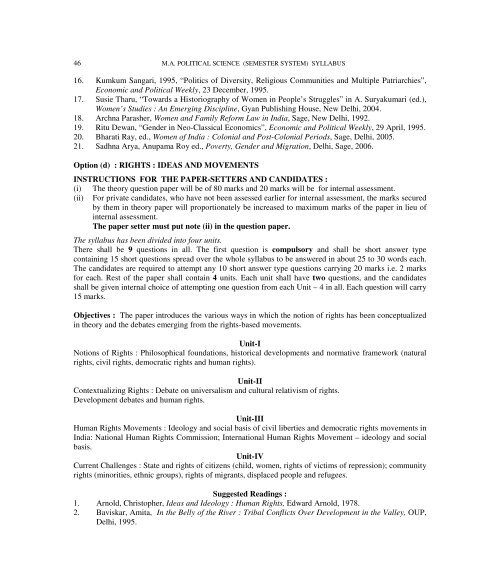
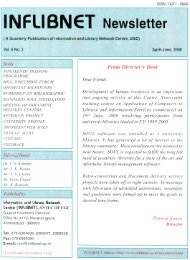

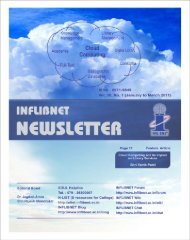
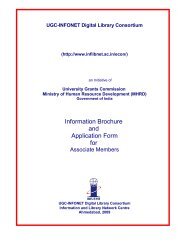
![Uni of Delhi_MA_History[1]. - INFLIBNET Centre](https://img.yumpu.com/48586372/1/190x245/uni-of-delhi-ma-history1-inflibnet-centre.jpg?quality=85)
